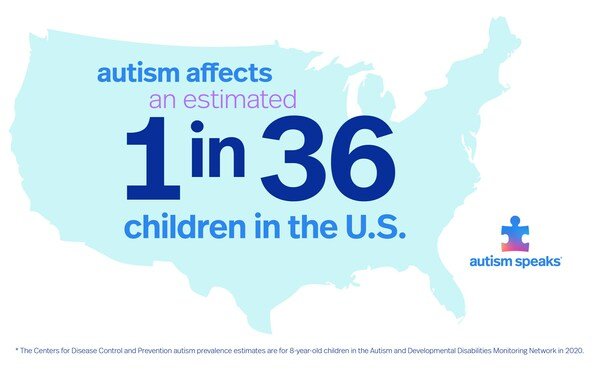Autism Speaks Pledges to Make World of Difference as Autism Prevalence Rises to 2.7% of Children in U.S.
24 March 2023 | Friday | News

Image Source : Public Domain
The Centers for Disease Control and Prevention (CDC) released today its update of autism's estimated prevalence among the nation's children, based on the active surveillance across 11 monitoring sites in the United States for 8-year-old children in 2020. The new report shows an increase in prevalence with 1 in 36 children, or just over 2.7% of 8-year-old children, diagnosed with autism spectrum disorder in 2020, and for the first time reveals higher prevalence rates among Black non-Hispanic (BNH), Hispanic, and Asian or Pacific Islander (A/PI) children compared to White non-Hispanic (WNH) children.
The increase reinforces progress in awareness and advocacy for early identification and diagnosis among all groups, but also reiterates the need for a significant increase in funding for autism research and services to be provided across the spectrum and lifespan, particularly in diverse communities where prevalence numbers were greater than those indicated by previous studies.
Key findings include:
- One in 36 children, or over 2.7% of 8-year-old children, in the U.S. was diagnosed with ASD in 2020, increasing from 2018 when the estimate was 1 in 44.
- The rate of autism was higher in BNH (29.3%), Hispanic (31.6%), and A/PI (33.4%) compared to WNH children (24.3%), indicating an improvement in outreach, screenings and de-stigmatization of autism diagnosis among minority communities.
- BNH autistic children were more likely than WNH and Hispanic autistic children to have a co-occurring intellectual disability. Autistic girls were also more likely to have a co-occurring intellectual disability when compared to autistic boys. Both findings indicate an undercounting of autism among BNH and female children, highlighting the need for greater research on the age at which BNH children and girls without intellectual disabilities receive autism evaluations and diagnoses.
- The COVID-19 pandemic limited data collection, potentially leading to an under-reporting of prevalence and reinforcing the need to explore long-term impacts of the COVID-19 pandemic on evaluation and diagnosis of autism.
The CDC findings strengthen Autism Speaks' commitment to creating a more inclusive world for all individuals with autism and to addressing disparities that exist among different races and ethnic communities through investments in research and programs, such as Autism Speaks' Autism Care Network, Caregiver Skills Training Program and community events, which increase family and clinician access to innovative tools for identifying autism and understanding what children are experiencing.
"With 2.7% of children in the U.S. being diagnosed with autism, the autism community needs our support now more than ever," said Keith Wargo, President & CEO, Autism Speaks. "We continue to prioritize advocacy and research efforts with the goal of supporting people across the spectrum, at all stages of life and in communities around the world, but we call on the public to recognize the growing need for services and for unity in order to achieve a more inclusive world. Together, we can make a world of difference for all people with autism."
This World Autism Month, Autism Speaks asks everyone to demonstrate they are standing with the autistic community, celebrating differences and including people with autism in all aspects of society through one of the many forms of action outlined on Autism Speaks' website. Supporters can request information, resources and tools to engage and advocate in their community, as well as learn about the mission delivery progress at Autism Speaks, in order to create a world where all people with autism can reach their full potential.
Most Read
- How Does GLP-1 Work?
- Innovations In Magnetic Resonance Imaging Introduced By United Imaging
- Management of Relapsed/Refractory Multiple Myeloma
- 2025 Drug Approvals, Decoded: What Every Biopharma Leader Needs to Know
- BioPharma Manufacturing Resilience: Lessons From Capacity Expansion and Supply Chain Resets from 2025
- APAC Biopharma Review 2025: Innovation, Investment, and Influence on the Global Stage
- Top 25 Biotech Innovations Redefining Health And Planet In 2025
- The New AI Gold Rush: Western Pharma’s Billion-Dollar Bet on Chinese Biotech
- Single-Use Systems Are Rewiring Biopharma Manufacturing
- The State of Biotech and Life Science Jobs in Asia Pacific – 2025
- Asia-Pacific Leads the Charge: Latest Global BioSupplier Technologies of 2025
- Invisible Threats, Visible Risks: How the Nitrosamine Crisis Reshaped Asia’s Pharmaceutical Quality Landscape
Bio Jobs
- Sanofi Turns The Page As Belén Garijo Steps In And Paul Hudson Steps Out
- Global Survey Reveals Nearly 40% of Employees Facing Fertility Challenges Consider Leaving Their Jobs
- BioMed X and AbbVie Begin Global Search for Bold Neuroscience Talent To Decode the Biology of Anhedonia
- Thermo Fisher Expands Bengaluru R&D Centre to Advance Antibody Innovation and Strengthen India’s Life Sciences Ecosystem
- Accord Plasma (Intas Group) Acquires Prothya Biosolutions to Expand Global Plasma Capabilities
- ACG Announces $200 Million Investment to Establish First U.S. Capsule Manufacturing Facility in Atlanta
- AstraZeneca Invests $4.5 Billion to Build Advanced Manufacturing Facility in Virginia, Expanding U.S. Medicine Production
News











